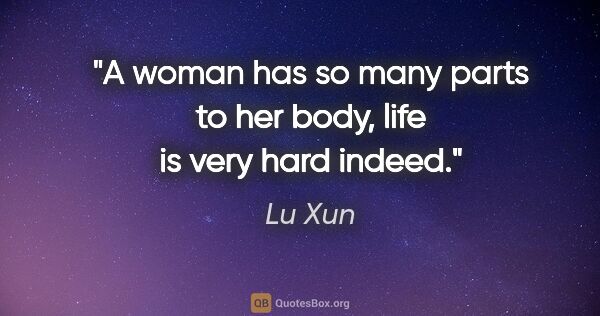Parts Quotes (page 110)
Slowly but surely I have been soaking Rilke up these last few months: the man, his work and his life. And that is probably the only right way with literature, with study, with people or with anything else: to let it all soak in, to let it all mature slowly inside you until it has become a part of yourself. That, too, is a growing process. Everything is a growing process. And in between, emotions and sensations that strike you like lightning. But still the most important thing is the organic...
Etty Hillesum
I look around at this world you're so eager to be a part of and all I see is six billion lunatics looking for the fastest ride out. Who's not crazy? Look around, everyone's drinking, smoking, shooting up, shooting each other, or just plain screwing their brains out 'cause they don't want 'em anymore. I'm crazy? Honey, I'm the original one-eyed chicklet in the kingdom of the blind, 'cause at least I admit the world makes me nuts.
Joss Whedon
And wasn't it terrible, how much he looked forward to those moments, so much so that sometimes even a ride by himself on the subway was the best part of the day? Wasn't it terrible that after all the work one put into finding a person to spend one's life with, after making a family with that person, even in spite of missing that person...that solitude was what one relished the most, the only thing that, even in fleeting, diminished doses, kept one sane?
Jhumpa Lahiri
Soon, however, she began to reason with herself, and try to be feeling less. Eight years, almost eight years had passed, since all had been given up. How absurd to be resuming the agitation which such an interval had banished into distance and indistinctness! What might not eight years do? Events of every description, changes, alienations, removals,--all, all must be comprised in it; and oblivion of the past--how natural, how certain too! It included nearly a third part of her own life. Alas!...
Jane Austen
The office was large, with many women and men at desks, and she learned their names, and presented to them an amiability she assumed upon entering the building. Often she felt that her smiles, and her feigned interest in people's anecdotes about commuting and complaints about colds, were an implicit and draining part of her job. A decade later she would know that spending time with people and being unable either to speak from her heart or to listen with it was an imperceptible bleeding of her...
Andre Dubus

